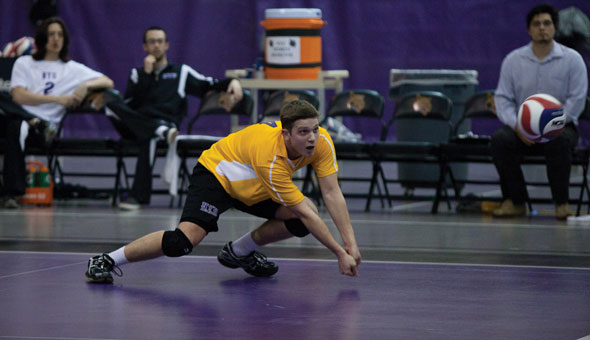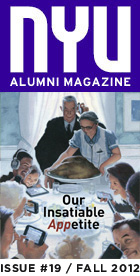alumni profile
Out, on the Court
Jay Hayes / Stern ’12
by Brian Dalek / GSAS ’10
Jay Hayes intended for his “It Gets Better” video to mirror the rest: sit facing a webcam and talk about being gay or bullied—and overcoming—like the other 50,000-plus videos uploaded to the project’s website to inspire LGBT youths. But the undertaking he embarked on in fall 2011, he says, “was just a total train wreck.” He looked awkward and fumbled his words. He felt too solitary staring at a laptop in his Manhattan apartment. In Hayes’ mind, the video couldn’t tell his story because so much of it had taken place on a volleyball court.
Hayes was a gregarious senior co-captain on the NYU Men’s Volleyball squad at the time, and he realized the most convincing way to send the message was with his teammates and coaches standing alongside him. Other college athletic departments had submitted similar videos, but they only hinted at athletes being gay or lesbian, and none included anyone who identified as such. Hayes decided to go to the heart of the matter. “I know I can achieve anything I set my mind on doing,” he says confidently in the resulting video, “and I can do that while being out and being proud of who I am.”
Within days, the video went viral on Facebook and gay blogs. The Huffington Post and New York Daily News praised it for its directness. In the nearly three-minute message, a string of men and women—entire teams from basketball, soccer, volleyball, and swimming—talk candidly about the lingering hostility toward homosexuality in sports and state that it will not be tolerated at NYU. Women’s Volleyball Coach Jolie Ward tells viewers she’s proud to be a mother and in a long-term, same-sex relationship. Assistant Swimming and Diving Coach Scott Donie, a 1992 Olympic silver medalist, who is not gay, talks about bullying based on one’s perceived sexual orientation. In the final seconds of the film, more than 100 student athletes, administrators, and coaches shout out: “It gets better!”
To understand the significance of this, one must look to the world of professional sports. No active American male athlete in any major sport—baseball, basketball, football, or hockey—has come out publicly. “There’s a real fear that if you let being gay take over who you are, then you won’t perform as well on the court or the field,” Hayes says. “That if you’re gay, you can’t be as good. There’s also the fear of losing the bonds you have with your teammates.”
This fear in particular kept Hayes in the closet until college. The few people who were out at the Catholic high school he attended in suburban Chicago had tended to participate in theater or band—not sports. And while he was close to his family, they were devout Catholics and he was unsure how to reveal himself within what he describes as “a very Christian, conservative, Midwest type of bubble.” Hayes decided to attend NYU for its competitive volleyball team and for the Leonard N. Stern School of Business, where he majored in marketing. But the prospect of living in such a gay-friendly city was comforting too.
During his sophomore year in New York, Hayes started telling some close family and friends that he was gay. He hesitated for a while to come out to teammates, but soon discovered it wasn’t an issue for them either. “He’s a teammate and a friend, and anything less than full support is not right,” says outside hitter Pat Dodd (CAS ’12), who also played club volleyball with Hayes in Illinois. It took him another year to tell Men’s Volleyball Coach Jose Piña (CAS ’87), who was gratified that Hayes trusted him enough to discuss it personally. “[Coming out] was his gift to give to us,” Piña says. “It’s not for someone to out him or to spread rumors.”
Buoyed by this support, Hayes wanted others to know that NYU accepts everyone on the court or field. He spent five months of his senior year writing and directing the “It Gets Better” film—with the aid of friends in the Tisch School of the Arts—while helping his volleyball team win 20 matches. Along with praise, came thanks. Gay athletes from across the country reached out to say how watching the video helped, and he recently addressed the issue in a panel discussion at Providence College in Rhode Island. Hayes is now working at the global consulting giant Accenture in Chicago but intends to continue spreading the message that young athletes should embrace who they are. “I thought I was done when the video was done,” he says. “But that’s not true. It’s really just the beginning for me.”







